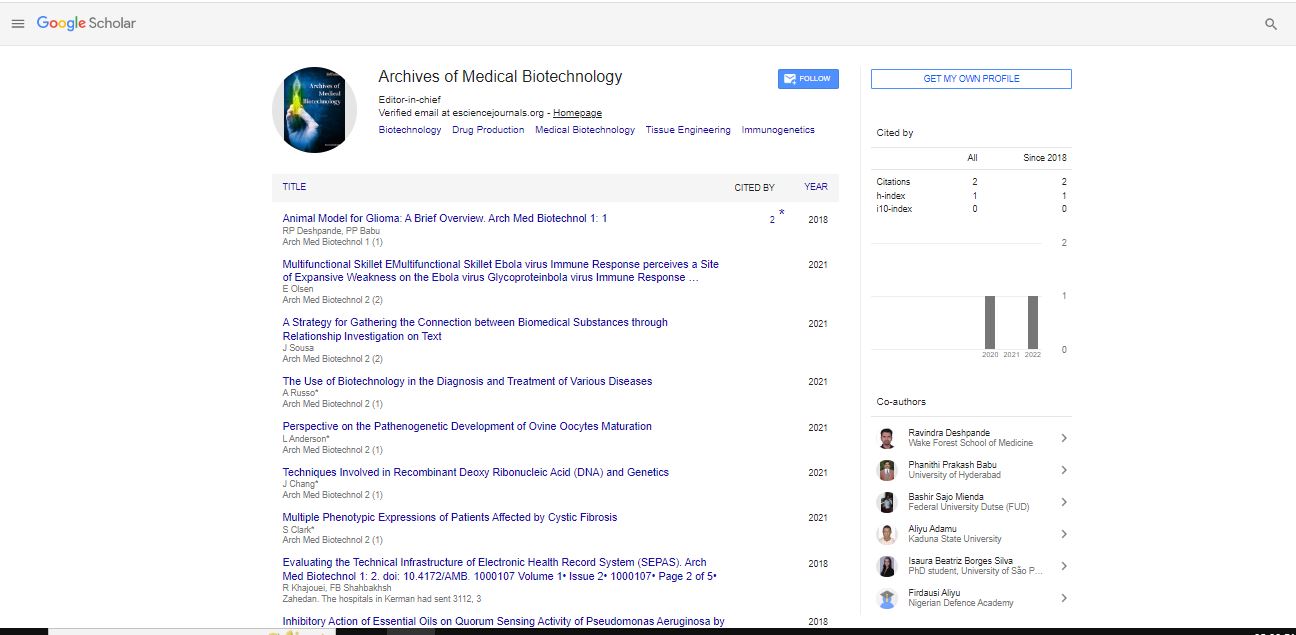Commentary, Arch Med Biotechnol Vol: 4 Issue: 2
Personalized Medicine: The Role of Genomics and Biomarkers
Amiu Haliad*
Department of Biotechnology and Medical Engineering, Universiti Teknologi Malaysia, Johor Bahru 81310, Johor, Malaysia
*Corresponding Author: Amiu Haliad,
Department of Biotechnology and Medical
Engineering, Universiti Teknologi, Johor Bahru 81310, Johor, Malaysia;
E-mail: ahaliad@ufu.uk
Received date: 22 May, 2023, Manuscript No. AMB-23-106359;
Editor assigned date: 24 May, 2023, PreQC No. AMB-23-106359 (PQ);
Reviewed date: 16 June, 2023, QC No. AMB-23-106359;
Revised date: 26 June, 2023, Manuscript No. AMB-23-106359 (R);
Published date: 03 July, 2023 DOI: 10.4172/amb.1000042.
Citation: Haliad A (2023) Personalized Medicine: The Role of Genomics and Biomarkers. Arch Med Biotechnol 4:2.
Abstract
Personalized medicine is an emerging approach in medical biotechnology that aims to tailor medical treatments to individual patients based on their unique genetic and molecular characteristics. This manuscript provides a comprehensive overview of personalized medicine, focusing on the role of genomics and biomarkers. It explores the principles and techniques of genomics, highlighting its contribution to understanding disease mechanisms and identifying potential therapeutic targets, by discussing the importance of biomarkers in disease diagnosis, prognosis, and treatment response prediction. Furthermore, it examines the challenges and ethical considerations associated with personalized medicine and the future prospects of this field in improving patient outcomes.
Keywords: Genomics; Medical biotechnology; Liquid biopsies
Description
The personalized medicine and its potential to revolutionize healthcare by shifting from a one-size-fits-all approach to tailored treatments. It emphasizes the need for a deeper understanding of the molecular basis of diseases and the role of genomics and biomarkers in guiding personalized treatment strategies.
Genomics
Understanding Disease Mechanisms This section explores the principles and techniques of genomics, focusing on the study of an individual's complete set of DNA, including both coding and noncoding regions. It discusses genomic sequencing technologies, such as Next-Generation Sequencing (NGS), and their applications in identifying genetic variations associated with diseases, highlighting the importance of large-scale genomic databases and collaborative efforts in advancing genomics research.
Genomic variants and disease associations
This section delves into the identification of genomic variants associated with diseases. It discusses Genome-Wide Association studies Studies (GWAS), which have identified thousands of genetic variants linked to various diseases, emphasizing the importance of functional characterization of these variants and their contribution to disease development, progression, and treatment response.
Pharmacogenomics: Personalized drug therapy
This section explores the role of pharmacogenomics in tailoring drug therapy to individual patients. It discusses how genetic variations can influence drug metabolism, efficacy, and adverse reactions, highlighting the importance of pharmacogenomic testing in optimizing drug selection, dosing, and avoiding adverse drug reactions.
Biomarkers
Tools for Disease Diagnosis and Prognosis This section focuses on biomarkers, which are measurable biological indicators of normal or abnormal processes in the body. It discusses the importance of biomarkers in disease diagnosis, prognosis, and treatment response prediction, by exploring different types of biomarkers, such as genetic, protein, and imaging biomarkers, and their applications in various diseases.
Liquid biopsies
Non-Invasive Biomarker Detection This section explores the emerging field of liquid biopsies, which involve the detection of biomarkers in bodily fluids like blood, urine, or saliva. It discusses the potential of liquid biopsies in non-invasive disease diagnosis, monitoring treatment response, and detecting minimal residual disease, addressing the challenges and future prospects of liquid biopsy-based diagnostics.
Challenges and ethical considerations
This section discusses the challenges associated with implementing personalized medicine, including the interpretation of genomic data, data privacy concerns, and the need for robust regulatory frameworks, addressing the ethical considerations surrounding genetic testing, patient autonomy, and equitable access to personalized medicine.
Future perspectives
The conclusion highlights the significant advancements in genomics and biomarkers that have paved the way for personalized medicine. It discusses the future prospects of integrating genomic information and biomarker analysis into routine clinical practice, by emphasizing the potential of personalized medicine to improve patient outcomes, optimize treatment efficacy, and reduce healthcare costs.
Conclusion
In summary, personalized medicine offers a transformative approach to healthcare by leveraging genomics and biomarkers to tailor medical treatments to individual patients. Genomics provides valuable insights into disease mechanisms, while biomarkers aid in disease diagnosis, prognosis, and treatment response prediction. Despite challenges and ethical considerations, personalized medicine holds great promise for improving patient outcomes and transforming healthcare. With continued advancements in genomics research and biomarker discovery, personalized medicine is poised to revolutionize the practice of medicine and pave the way for more precise and effective treatments.
 Spanish
Spanish  Chinese
Chinese  Russian
Russian  German
German  French
French  Japanese
Japanese  Portuguese
Portuguese  Hindi
Hindi 